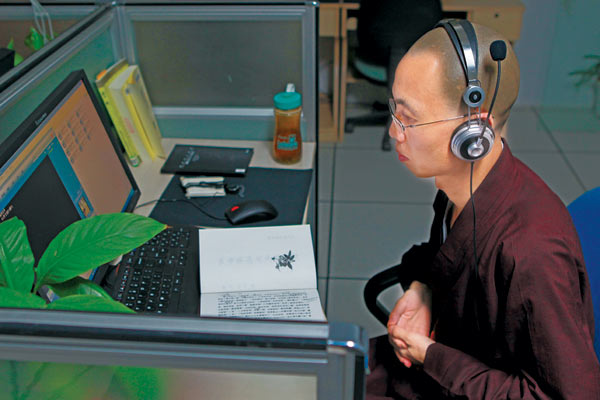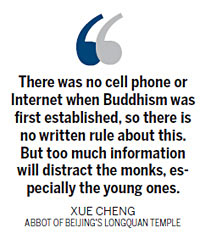The Modern Monks of China
Updated: 2011-07-17 10:58
By Tang Yue (China Daily)
|
|||||||||||
 |
|
Monks in the IT age use the Internet to share lessons and also to spread Buddhist teachings through multilingual microblogs. [Photo by Cui Meng / China Daily] |
Physical comforts aside, Buddhist lessons for the novices are also very different from the darker ages.
To make lessons relevant, movies like The Matrix, The Ice Age, and Kungfu Panda are incorporated into the lectures.
"Traditional culture and religion must fit in with modern society. Life in ancient times was very simple and static, now the world changes from day to day and we have to keep abreast," says Abbot Xue Cheng, who is also the vice-president of the Buddhist Association of China.
 |
His microblog is translated into seven languages - English, Japanese, Korean, Russian, French, Spanish and German - thanks to volunteers.
On the temple's website are streamed videos of Buddhism lectures, and a recently launched interactive program.
Offline, the temple welcomes those who are interested in Buddhism to learn more about the religion at the temple. College students, white-collar workers and even the Party School of the CPC Central Committee have all signed the guest-book.
The monks at Longquan bring their beliefs into daily life.
They have set up a foundation for charity, where believers and volunteers can join in activities that include distributing free porridge and a kind greeting to office workers in the CBD who are too busy to have breakfast, such as the harried passengers at the Beijing West Railway Station.
"As the quality of material life improves in China, the people's need for a more fulfilled spiritual life rises, and more and more people are interested in Buddhism," says Xian Jian, 38, who used to teach economics in Henan University.
"If you see it from the perspective of satisfying the market, we are just trying to expand the channels and meet the demands of 'potential customers," he says, betraying his secular education.
But the consequences of pop culture, the runaway pace of life and temptations from advanced communication channels worry the abbot.
So it is that only senior monks are trusted to keep updated online, while novices are not allowed to have cell phones or to browse content on the Internet not related to Buddhism.
"Too much information will distract the monks, especially the young ones," according to the abbot.
This rule can be hard for novices from the IT age, like Xian Xun. He was a fan of the LA Lakers and the Houston Rockets, and he used to watch a lot of NBA games in college.
When he first came to the temple last summer, he couldn't help but log on to the sports news when he was online.
"It still comes to mind, but I don't do it anymore," he says. Online pornography is a challenge as well, and despite firewalls and blocks, the cheeky content can still pop up unexpectedly. These temptations justify the abbot's strict rules of no Internet.
There is yet another, unexpected, hurdle for the abbot at Longquan Temple - the question of money and profitability.
Unlike his famous counterpart at Shaolin Temple, Abbot Xue Cheng has chosen to keep business outside his temple gate.
Visitors are not charged admission, and even the joss sticks for devotees at the temple are free of charge.
None of the monks are paid an allowance for fear that "salary leads to inequality".
"The gap between the rich and poor has been the root of social problems the world over. No money, no distractions," the abbot says.
"Now some temples are doing business. The function and space of the temple is severely impacted. It is for us to keep the integrity of the temple."
You can contact the writer at tangyue@chinadaily.com.cn.
Hot Topics
Philippines President Benigno Aquino III (C) plants a tree with Chinese government officials at a clan hall in Hongjian village, Zhangzhou city of East China's Fujian province, on Saturday.
Editor's Picks

|

|

|

|

|

|







